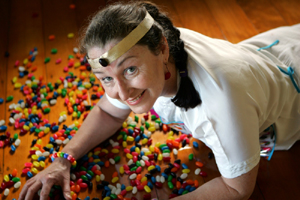Some cancer patients, ignoring medical advice, are choosing ‘natural’ approaches to their disease. Steve Jobs (co-founder, chairman, and CEO of Apple Inc), Penelope Dingle, Sharyn and her daughter, Jess Ainscough, all used alternative interventions before dying of cancer. Despite phenomenal progress with medical treatments, cancer quackery remains a flourishing and lucrative business throughout the developed world.
What interventions are promoted?
Where are patients getting this advice?
Should we be concerned?
Advice on alternative cancer ‘cures’ might come from health practitioners, the media and the internet.
A wide range of complementary interventions is promoted as cancer cures.
They include caesium, carnivora, Coenzyme Q10, essiac, entelev, gravioli, fish oil, hemp oil, hydrazine sulphate, laetrile, maritime pine bark extract, maroon bush tea, noni juice, paw-paw, shark cartilage, sheep sorrel, Sir Jason Winters tea, Ukraine, Vitamin C, wheat grass and zeolite.
So called cancer diets include raw food or vegan. Protocols include Hoxsey, Gerson, Jim Kelmun Baking Soda & Maple Syrup, Budwig diet and “dirt cheap”. Many diets include coffee enemas.
Homeopathic remedies are also promoted as cures as well.
Advice might also include products applied externally, such as bicarbonate of soda and black & red salve. Then there are intravenous interventions such as miracle mineral supplement (MMS), megadose vitamins and minerals and hydrogen peroxide. Other interventions might involve some type of chamber for ozone therapy, whole-body hyperthermia or some type of action, including removing mercury from dental fillings.
Physical interventions include meditation, esoteric breast massage; psychological interventions include hypnotherapy.
There might even be some kind of mystical force implicated as the cause of the cancer, where the practitioner claims to repair “fractured chakras” to cure the cancer, or some kind of “energy medicine”, such as Reiki. Electrical devices include the Rife Generator, the Quantum Pulse and the Photon Genius. The list goes on.
There is no evidence to support any of these interventions.
There are estimated to be 10,000 naturopaths and 700 homeopaths in Australia. While many give perfectly good lifestyle advice, others work outside their scope of practice to target patients with life-threatening diseases. Some registered medical practitioners, including ‘Integrative Medicine’ & alternative medicines (AltMed) practitioners, also claim to offer ‘holistic’ interventions for cancer patients.
Advice might also come from magazines and books advertised on the internet, or from websites, blogs and social media.
There are many reasons why people with cancer turn away from conventional treatments, including being frightened of surgery, chemotherapy or radiotherapy. Claims of a “grand conspiracy of the hidden cancer cure” might encourage patients to mistrust medical practitioners and medical research. Many benefit from the financial gains in promoting alternative interventions.
Sadly, some patients have just run out of options and will try any intervention claimed to offer a cure.
Even though we have put a man on the moon and harnessed the power of the atom, we still can’t cure many cancers. Cancer is not a single disease, but a category of many individual diseases which remain challenging to treat. However, with improvements in surgery, diagnosis, radiotherapy and new medications, there has been real progress in how long people are living in good health after their cancer diagnosis. The overall median survival time for all cancer types 40 years ago was just one year – now it is nearly six years! Although there has been little progress for cancers like lung and brain, there have been dramatic improvements in survival time for leukaemia, breast cancer, colon cancer and non-Hodgkin’s lymphoma.
Encouraged by false and misleading claims made by high profile ‘celebrities’ who are social media ‘savvy’, an increasing number of young cancer patients are dying because they are choosing ‘diet-based’ interventions over proven treatments. People diagnosed with cancer are amongst our psychologically most vulnerable patients and can easily be swayed by those offering hype and hope without proof. Patients have been burned, starved and unnecessarily left in severe pain.
Pharmacists are one of our most trusted health professionals. They might, however, be contributing to the problem by selling placebo products and by hiring in-store alternative practitioners, who have little interest in evidence-based medicine and who often use belief-based diagnostic techniques, to sell ineffective, unnecessary or inappropriate complementary tests and interventions to increase store profits.
